Principle of Nursing literature Review 2022
VerifiedAdded on 2022/10/11
|9
|2444
|9
AI Summary
Contribute Materials
Your contribution can guide someone’s learning journey. Share your
documents today.
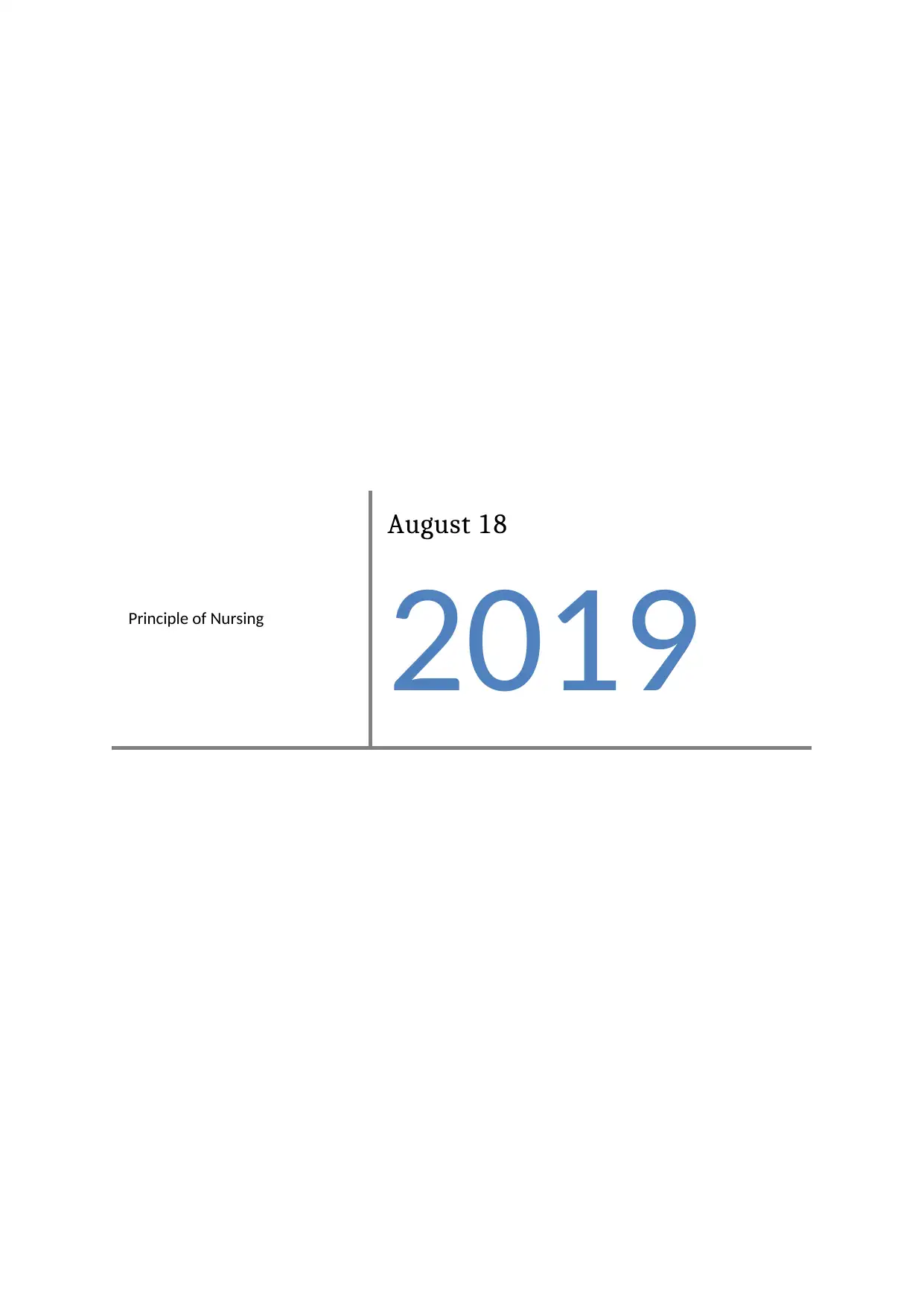
Principle of Nursing
August 18
2019
August 18
2019
Secure Best Marks with AI Grader
Need help grading? Try our AI Grader for instant feedback on your assignments.
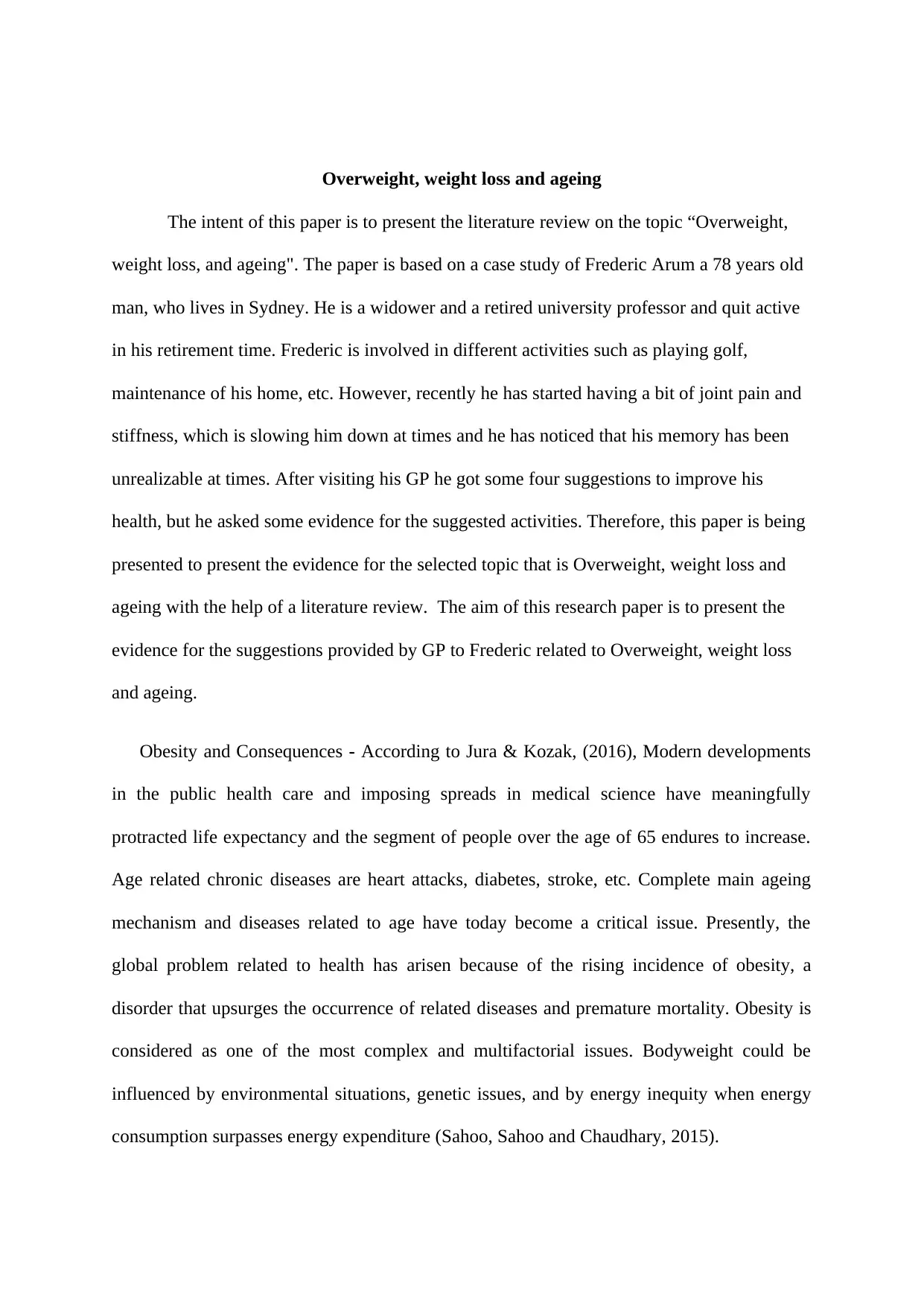
Overweight, weight loss and ageing
The intent of this paper is to present the literature review on the topic “Overweight,
weight loss, and ageing". The paper is based on a case study of Frederic Arum a 78 years old
man, who lives in Sydney. He is a widower and a retired university professor and quit active
in his retirement time. Frederic is involved in different activities such as playing golf,
maintenance of his home, etc. However, recently he has started having a bit of joint pain and
stiffness, which is slowing him down at times and he has noticed that his memory has been
unrealizable at times. After visiting his GP he got some four suggestions to improve his
health, but he asked some evidence for the suggested activities. Therefore, this paper is being
presented to present the evidence for the selected topic that is Overweight, weight loss and
ageing with the help of a literature review. The aim of this research paper is to present the
evidence for the suggestions provided by GP to Frederic related to Overweight, weight loss
and ageing.
Obesity and Consequences - According to Jura & Kozak, (2016), Modern developments
in the public health care and imposing spreads in medical science have meaningfully
protracted life expectancy and the segment of people over the age of 65 endures to increase.
Age related chronic diseases are heart attacks, diabetes, stroke, etc. Complete main ageing
mechanism and diseases related to age have today become a critical issue. Presently, the
global problem related to health has arisen because of the rising incidence of obesity, a
disorder that upsurges the occurrence of related diseases and premature mortality. Obesity is
considered as one of the most complex and multifactorial issues. Bodyweight could be
influenced by environmental situations, genetic issues, and by energy inequity when energy
consumption surpasses energy expenditure (Sahoo, Sahoo and Chaudhary, 2015).
The intent of this paper is to present the literature review on the topic “Overweight,
weight loss, and ageing". The paper is based on a case study of Frederic Arum a 78 years old
man, who lives in Sydney. He is a widower and a retired university professor and quit active
in his retirement time. Frederic is involved in different activities such as playing golf,
maintenance of his home, etc. However, recently he has started having a bit of joint pain and
stiffness, which is slowing him down at times and he has noticed that his memory has been
unrealizable at times. After visiting his GP he got some four suggestions to improve his
health, but he asked some evidence for the suggested activities. Therefore, this paper is being
presented to present the evidence for the selected topic that is Overweight, weight loss and
ageing with the help of a literature review. The aim of this research paper is to present the
evidence for the suggestions provided by GP to Frederic related to Overweight, weight loss
and ageing.
Obesity and Consequences - According to Jura & Kozak, (2016), Modern developments
in the public health care and imposing spreads in medical science have meaningfully
protracted life expectancy and the segment of people over the age of 65 endures to increase.
Age related chronic diseases are heart attacks, diabetes, stroke, etc. Complete main ageing
mechanism and diseases related to age have today become a critical issue. Presently, the
global problem related to health has arisen because of the rising incidence of obesity, a
disorder that upsurges the occurrence of related diseases and premature mortality. Obesity is
considered as one of the most complex and multifactorial issues. Bodyweight could be
influenced by environmental situations, genetic issues, and by energy inequity when energy
consumption surpasses energy expenditure (Sahoo, Sahoo and Chaudhary, 2015).
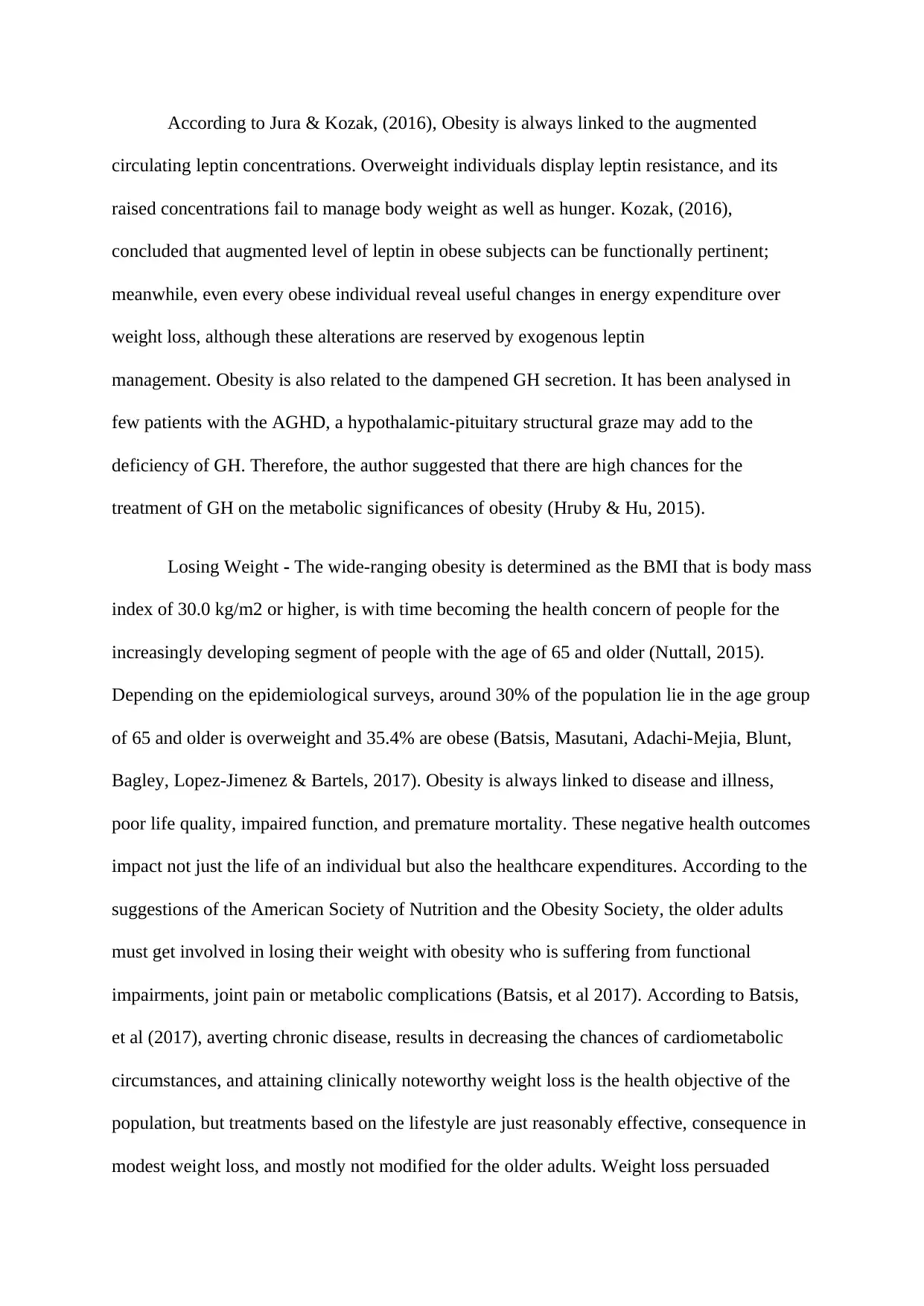
According to Jura & Kozak, (2016), Obesity is always linked to the augmented
circulating leptin concentrations. Overweight individuals display leptin resistance, and its
raised concentrations fail to manage body weight as well as hunger. Kozak, (2016),
concluded that augmented level of leptin in obese subjects can be functionally pertinent;
meanwhile, even every obese individual reveal useful changes in energy expenditure over
weight loss, although these alterations are reserved by exogenous leptin
management. Obesity is also related to the dampened GH secretion. It has been analysed in
few patients with the AGHD, a hypothalamic-pituitary structural graze may add to the
deficiency of GH. Therefore, the author suggested that there are high chances for the
treatment of GH on the metabolic significances of obesity (Hruby & Hu, 2015).
Losing Weight - The wide-ranging obesity is determined as the BMI that is body mass
index of 30.0 kg/m2 or higher, is with time becoming the health concern of people for the
increasingly developing segment of people with the age of 65 and older (Nuttall, 2015).
Depending on the epidemiological surveys, around 30% of the population lie in the age group
of 65 and older is overweight and 35.4% are obese (Batsis, Masutani, Adachi-Mejia, Blunt,
Bagley, Lopez-Jimenez & Bartels, 2017). Obesity is always linked to disease and illness,
poor life quality, impaired function, and premature mortality. These negative health outcomes
impact not just the life of an individual but also the healthcare expenditures. According to the
suggestions of the American Society of Nutrition and the Obesity Society, the older adults
must get involved in losing their weight with obesity who is suffering from functional
impairments, joint pain or metabolic complications (Batsis, et al 2017). According to Batsis,
et al (2017), averting chronic disease, results in decreasing the chances of cardiometabolic
circumstances, and attaining clinically noteworthy weight loss is the health objective of the
population, but treatments based on the lifestyle are just reasonably effective, consequence in
modest weight loss, and mostly not modified for the older adults. Weight loss persuaded
circulating leptin concentrations. Overweight individuals display leptin resistance, and its
raised concentrations fail to manage body weight as well as hunger. Kozak, (2016),
concluded that augmented level of leptin in obese subjects can be functionally pertinent;
meanwhile, even every obese individual reveal useful changes in energy expenditure over
weight loss, although these alterations are reserved by exogenous leptin
management. Obesity is also related to the dampened GH secretion. It has been analysed in
few patients with the AGHD, a hypothalamic-pituitary structural graze may add to the
deficiency of GH. Therefore, the author suggested that there are high chances for the
treatment of GH on the metabolic significances of obesity (Hruby & Hu, 2015).
Losing Weight - The wide-ranging obesity is determined as the BMI that is body mass
index of 30.0 kg/m2 or higher, is with time becoming the health concern of people for the
increasingly developing segment of people with the age of 65 and older (Nuttall, 2015).
Depending on the epidemiological surveys, around 30% of the population lie in the age group
of 65 and older is overweight and 35.4% are obese (Batsis, Masutani, Adachi-Mejia, Blunt,
Bagley, Lopez-Jimenez & Bartels, 2017). Obesity is always linked to disease and illness,
poor life quality, impaired function, and premature mortality. These negative health outcomes
impact not just the life of an individual but also the healthcare expenditures. According to the
suggestions of the American Society of Nutrition and the Obesity Society, the older adults
must get involved in losing their weight with obesity who is suffering from functional
impairments, joint pain or metabolic complications (Batsis, et al 2017). According to Batsis,
et al (2017), averting chronic disease, results in decreasing the chances of cardiometabolic
circumstances, and attaining clinically noteworthy weight loss is the health objective of the
population, but treatments based on the lifestyle are just reasonably effective, consequence in
modest weight loss, and mostly not modified for the older adults. Weight loss persuaded
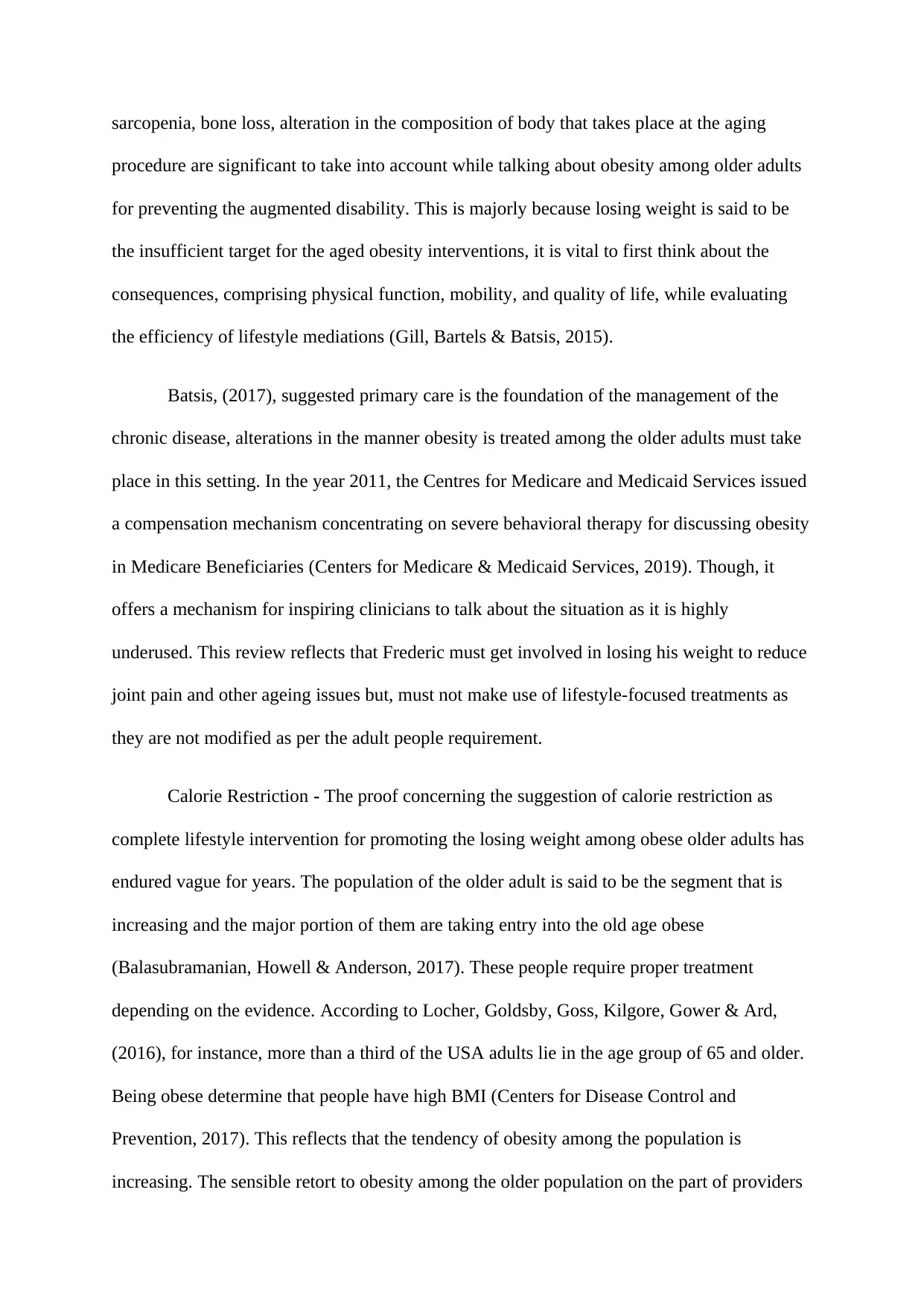
sarcopenia, bone loss, alteration in the composition of body that takes place at the aging
procedure are significant to take into account while talking about obesity among older adults
for preventing the augmented disability. This is majorly because losing weight is said to be
the insufficient target for the aged obesity interventions, it is vital to first think about the
consequences, comprising physical function, mobility, and quality of life, while evaluating
the efficiency of lifestyle mediations (Gill, Bartels & Batsis, 2015).
Batsis, (2017), suggested primary care is the foundation of the management of the
chronic disease, alterations in the manner obesity is treated among the older adults must take
place in this setting. In the year 2011, the Centres for Medicare and Medicaid Services issued
a compensation mechanism concentrating on severe behavioral therapy for discussing obesity
in Medicare Beneficiaries (Centers for Medicare & Medicaid Services, 2019). Though, it
offers a mechanism for inspiring clinicians to talk about the situation as it is highly
underused. This review reflects that Frederic must get involved in losing his weight to reduce
joint pain and other ageing issues but, must not make use of lifestyle-focused treatments as
they are not modified as per the adult people requirement.
Calorie Restriction - The proof concerning the suggestion of calorie restriction as
complete lifestyle intervention for promoting the losing weight among obese older adults has
endured vague for years. The population of the older adult is said to be the segment that is
increasing and the major portion of them are taking entry into the old age obese
(Balasubramanian, Howell & Anderson, 2017). These people require proper treatment
depending on the evidence. According to Locher, Goldsby, Goss, Kilgore, Gower & Ard,
(2016), for instance, more than a third of the USA adults lie in the age group of 65 and older.
Being obese determine that people have high BMI (Centers for Disease Control and
Prevention, 2017). This reflects that the tendency of obesity among the population is
increasing. The sensible retort to obesity among the older population on the part of providers
procedure are significant to take into account while talking about obesity among older adults
for preventing the augmented disability. This is majorly because losing weight is said to be
the insufficient target for the aged obesity interventions, it is vital to first think about the
consequences, comprising physical function, mobility, and quality of life, while evaluating
the efficiency of lifestyle mediations (Gill, Bartels & Batsis, 2015).
Batsis, (2017), suggested primary care is the foundation of the management of the
chronic disease, alterations in the manner obesity is treated among the older adults must take
place in this setting. In the year 2011, the Centres for Medicare and Medicaid Services issued
a compensation mechanism concentrating on severe behavioral therapy for discussing obesity
in Medicare Beneficiaries (Centers for Medicare & Medicaid Services, 2019). Though, it
offers a mechanism for inspiring clinicians to talk about the situation as it is highly
underused. This review reflects that Frederic must get involved in losing his weight to reduce
joint pain and other ageing issues but, must not make use of lifestyle-focused treatments as
they are not modified as per the adult people requirement.
Calorie Restriction - The proof concerning the suggestion of calorie restriction as
complete lifestyle intervention for promoting the losing weight among obese older adults has
endured vague for years. The population of the older adult is said to be the segment that is
increasing and the major portion of them are taking entry into the old age obese
(Balasubramanian, Howell & Anderson, 2017). These people require proper treatment
depending on the evidence. According to Locher, Goldsby, Goss, Kilgore, Gower & Ard,
(2016), for instance, more than a third of the USA adults lie in the age group of 65 and older.
Being obese determine that people have high BMI (Centers for Disease Control and
Prevention, 2017). This reflects that the tendency of obesity among the population is
increasing. The sensible retort to obesity among the older population on the part of providers
Secure Best Marks with AI Grader
Need help grading? Try our AI Grader for instant feedback on your assignments.
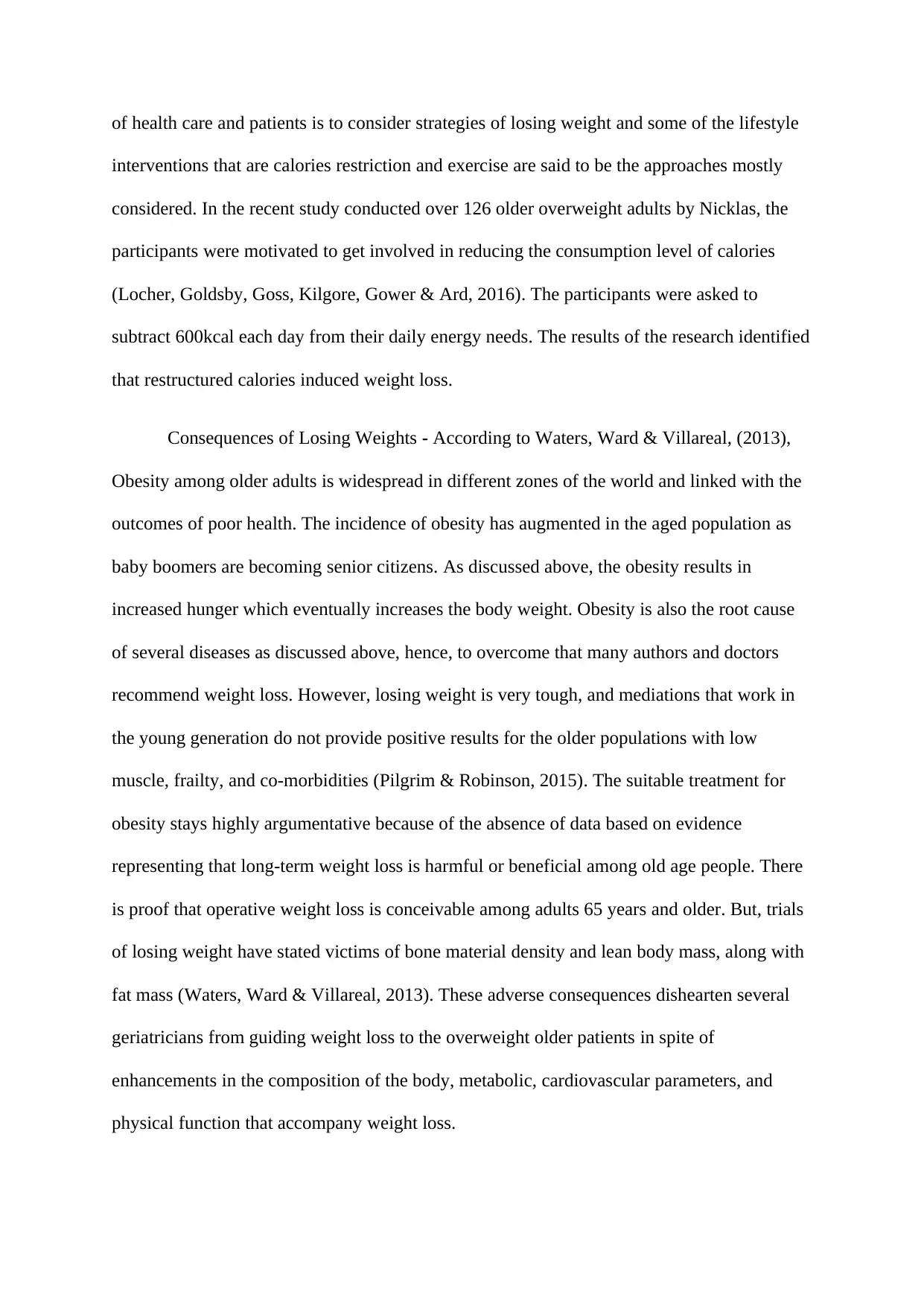
of health care and patients is to consider strategies of losing weight and some of the lifestyle
interventions that are calories restriction and exercise are said to be the approaches mostly
considered. In the recent study conducted over 126 older overweight adults by Nicklas, the
participants were motivated to get involved in reducing the consumption level of calories
(Locher, Goldsby, Goss, Kilgore, Gower & Ard, 2016). The participants were asked to
subtract 600kcal each day from their daily energy needs. The results of the research identified
that restructured calories induced weight loss.
Consequences of Losing Weights - According to Waters, Ward & Villareal, (2013),
Obesity among older adults is widespread in different zones of the world and linked with the
outcomes of poor health. The incidence of obesity has augmented in the aged population as
baby boomers are becoming senior citizens. As discussed above, the obesity results in
increased hunger which eventually increases the body weight. Obesity is also the root cause
of several diseases as discussed above, hence, to overcome that many authors and doctors
recommend weight loss. However, losing weight is very tough, and mediations that work in
the young generation do not provide positive results for the older populations with low
muscle, frailty, and co-morbidities (Pilgrim & Robinson, 2015). The suitable treatment for
obesity stays highly argumentative because of the absence of data based on evidence
representing that long-term weight loss is harmful or beneficial among old age people. There
is proof that operative weight loss is conceivable among adults 65 years and older. But, trials
of losing weight have stated victims of bone material density and lean body mass, along with
fat mass (Waters, Ward & Villareal, 2013). These adverse consequences dishearten several
geriatricians from guiding weight loss to the overweight older patients in spite of
enhancements in the composition of the body, metabolic, cardiovascular parameters, and
physical function that accompany weight loss.
interventions that are calories restriction and exercise are said to be the approaches mostly
considered. In the recent study conducted over 126 older overweight adults by Nicklas, the
participants were motivated to get involved in reducing the consumption level of calories
(Locher, Goldsby, Goss, Kilgore, Gower & Ard, 2016). The participants were asked to
subtract 600kcal each day from their daily energy needs. The results of the research identified
that restructured calories induced weight loss.
Consequences of Losing Weights - According to Waters, Ward & Villareal, (2013),
Obesity among older adults is widespread in different zones of the world and linked with the
outcomes of poor health. The incidence of obesity has augmented in the aged population as
baby boomers are becoming senior citizens. As discussed above, the obesity results in
increased hunger which eventually increases the body weight. Obesity is also the root cause
of several diseases as discussed above, hence, to overcome that many authors and doctors
recommend weight loss. However, losing weight is very tough, and mediations that work in
the young generation do not provide positive results for the older populations with low
muscle, frailty, and co-morbidities (Pilgrim & Robinson, 2015). The suitable treatment for
obesity stays highly argumentative because of the absence of data based on evidence
representing that long-term weight loss is harmful or beneficial among old age people. There
is proof that operative weight loss is conceivable among adults 65 years and older. But, trials
of losing weight have stated victims of bone material density and lean body mass, along with
fat mass (Waters, Ward & Villareal, 2013). These adverse consequences dishearten several
geriatricians from guiding weight loss to the overweight older patients in spite of
enhancements in the composition of the body, metabolic, cardiovascular parameters, and
physical function that accompany weight loss.
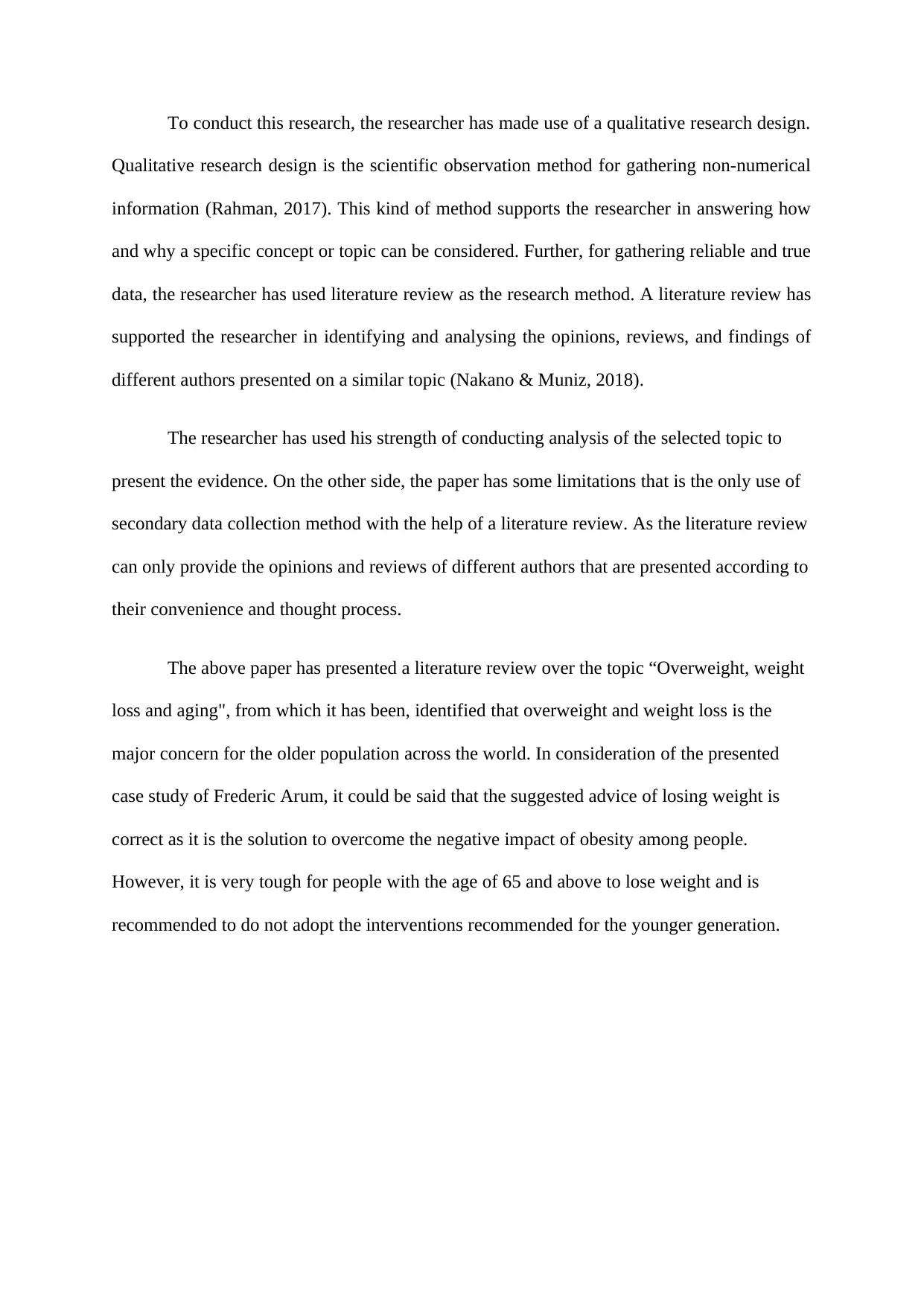
To conduct this research, the researcher has made use of a qualitative research design.
Qualitative research design is the scientific observation method for gathering non-numerical
information (Rahman, 2017). This kind of method supports the researcher in answering how
and why a specific concept or topic can be considered. Further, for gathering reliable and true
data, the researcher has used literature review as the research method. A literature review has
supported the researcher in identifying and analysing the opinions, reviews, and findings of
different authors presented on a similar topic (Nakano & Muniz, 2018).
The researcher has used his strength of conducting analysis of the selected topic to
present the evidence. On the other side, the paper has some limitations that is the only use of
secondary data collection method with the help of a literature review. As the literature review
can only provide the opinions and reviews of different authors that are presented according to
their convenience and thought process.
The above paper has presented a literature review over the topic “Overweight, weight
loss and aging", from which it has been, identified that overweight and weight loss is the
major concern for the older population across the world. In consideration of the presented
case study of Frederic Arum, it could be said that the suggested advice of losing weight is
correct as it is the solution to overcome the negative impact of obesity among people.
However, it is very tough for people with the age of 65 and above to lose weight and is
recommended to do not adopt the interventions recommended for the younger generation.
Qualitative research design is the scientific observation method for gathering non-numerical
information (Rahman, 2017). This kind of method supports the researcher in answering how
and why a specific concept or topic can be considered. Further, for gathering reliable and true
data, the researcher has used literature review as the research method. A literature review has
supported the researcher in identifying and analysing the opinions, reviews, and findings of
different authors presented on a similar topic (Nakano & Muniz, 2018).
The researcher has used his strength of conducting analysis of the selected topic to
present the evidence. On the other side, the paper has some limitations that is the only use of
secondary data collection method with the help of a literature review. As the literature review
can only provide the opinions and reviews of different authors that are presented according to
their convenience and thought process.
The above paper has presented a literature review over the topic “Overweight, weight
loss and aging", from which it has been, identified that overweight and weight loss is the
major concern for the older population across the world. In consideration of the presented
case study of Frederic Arum, it could be said that the suggested advice of losing weight is
correct as it is the solution to overcome the negative impact of obesity among people.
However, it is very tough for people with the age of 65 and above to lose weight and is
recommended to do not adopt the interventions recommended for the younger generation.
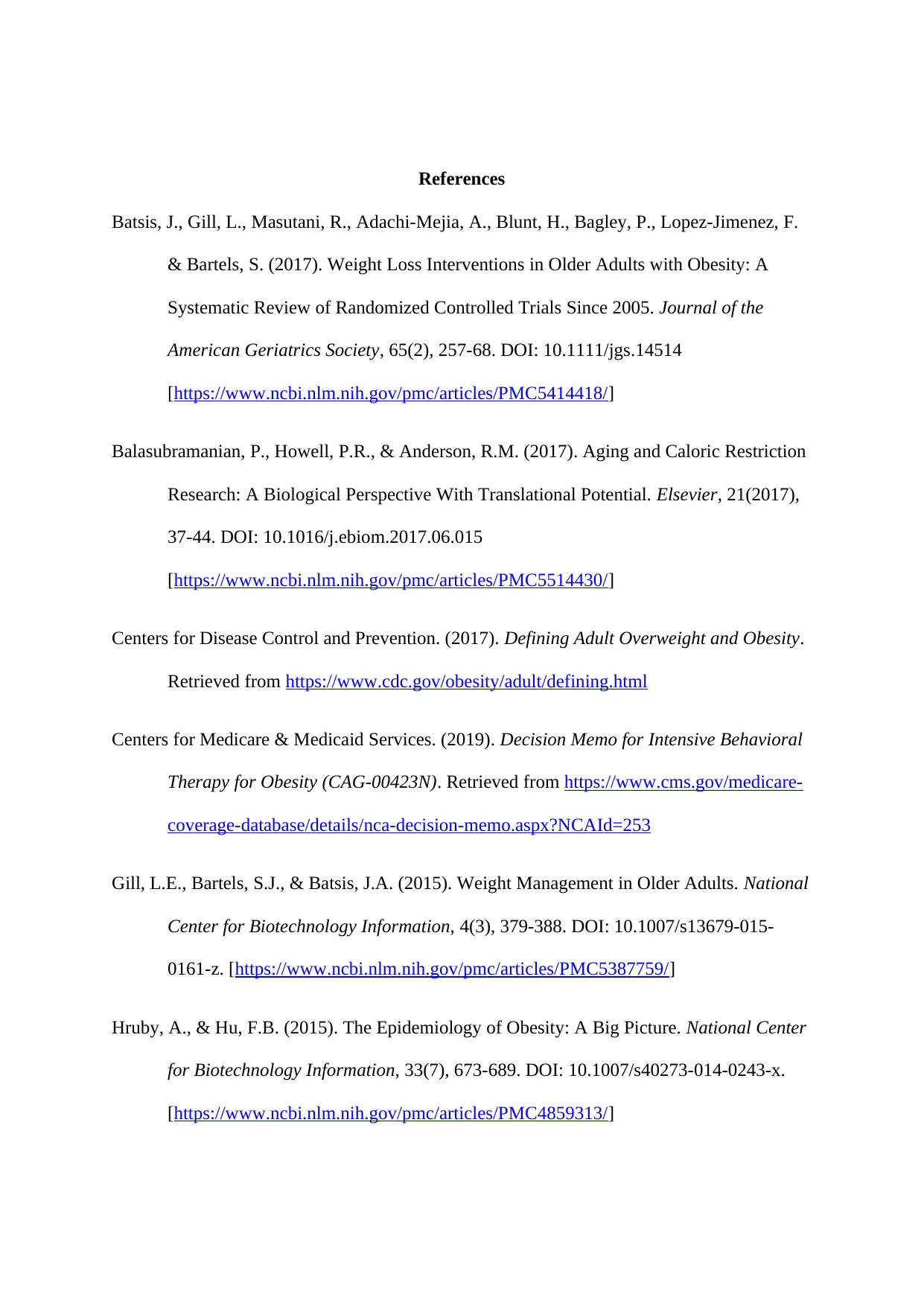
References
Batsis, J., Gill, L., Masutani, R., Adachi-Mejia, A., Blunt, H., Bagley, P., Lopez-Jimenez, F.
& Bartels, S. (2017). Weight Loss Interventions in Older Adults with Obesity: A
Systematic Review of Randomized Controlled Trials Since 2005. Journal of the
American Geriatrics Society, 65(2), 257-68. DOI: 10.1111/jgs.14514
[https://www.ncbi.nlm.nih.gov/pmc/articles/PMC5414418/]
Balasubramanian, P., Howell, P.R., & Anderson, R.M. (2017). Aging and Caloric Restriction
Research: A Biological Perspective With Translational Potential. Elsevier, 21(2017),
37-44. DOI: 10.1016/j.ebiom.2017.06.015
[https://www.ncbi.nlm.nih.gov/pmc/articles/PMC5514430/]
Centers for Disease Control and Prevention. (2017). Defining Adult Overweight and Obesity.
Retrieved from https://www.cdc.gov/obesity/adult/defining.html
Centers for Medicare & Medicaid Services. (2019). Decision Memo for Intensive Behavioral
Therapy for Obesity (CAG-00423N). Retrieved from https://www.cms.gov/medicare-
coverage-database/details/nca-decision-memo.aspx?NCAId=253
Gill, L.E., Bartels, S.J., & Batsis, J.A. (2015). Weight Management in Older Adults. National
Center for Biotechnology Information, 4(3), 379-388. DOI: 10.1007/s13679-015-
0161-z. [https://www.ncbi.nlm.nih.gov/pmc/articles/PMC5387759/]
Hruby, A., & Hu, F.B. (2015). The Epidemiology of Obesity: A Big Picture. National Center
for Biotechnology Information, 33(7), 673-689. DOI: 10.1007/s40273-014-0243-x.
[https://www.ncbi.nlm.nih.gov/pmc/articles/PMC4859313/]
Batsis, J., Gill, L., Masutani, R., Adachi-Mejia, A., Blunt, H., Bagley, P., Lopez-Jimenez, F.
& Bartels, S. (2017). Weight Loss Interventions in Older Adults with Obesity: A
Systematic Review of Randomized Controlled Trials Since 2005. Journal of the
American Geriatrics Society, 65(2), 257-68. DOI: 10.1111/jgs.14514
[https://www.ncbi.nlm.nih.gov/pmc/articles/PMC5414418/]
Balasubramanian, P., Howell, P.R., & Anderson, R.M. (2017). Aging and Caloric Restriction
Research: A Biological Perspective With Translational Potential. Elsevier, 21(2017),
37-44. DOI: 10.1016/j.ebiom.2017.06.015
[https://www.ncbi.nlm.nih.gov/pmc/articles/PMC5514430/]
Centers for Disease Control and Prevention. (2017). Defining Adult Overweight and Obesity.
Retrieved from https://www.cdc.gov/obesity/adult/defining.html
Centers for Medicare & Medicaid Services. (2019). Decision Memo for Intensive Behavioral
Therapy for Obesity (CAG-00423N). Retrieved from https://www.cms.gov/medicare-
coverage-database/details/nca-decision-memo.aspx?NCAId=253
Gill, L.E., Bartels, S.J., & Batsis, J.A. (2015). Weight Management in Older Adults. National
Center for Biotechnology Information, 4(3), 379-388. DOI: 10.1007/s13679-015-
0161-z. [https://www.ncbi.nlm.nih.gov/pmc/articles/PMC5387759/]
Hruby, A., & Hu, F.B. (2015). The Epidemiology of Obesity: A Big Picture. National Center
for Biotechnology Information, 33(7), 673-689. DOI: 10.1007/s40273-014-0243-x.
[https://www.ncbi.nlm.nih.gov/pmc/articles/PMC4859313/]
Paraphrase This Document
Need a fresh take? Get an instant paraphrase of this document with our AI Paraphraser
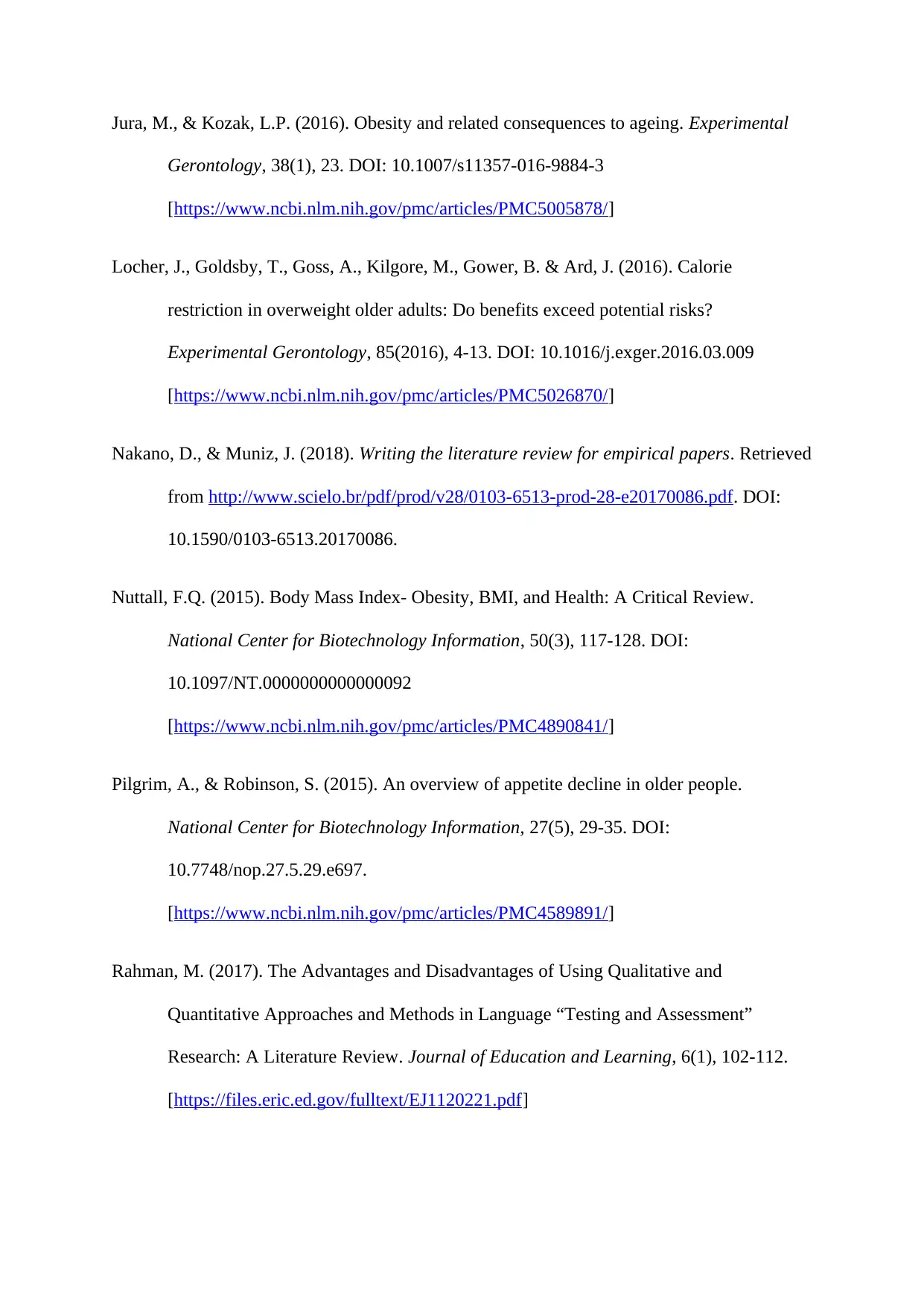
Jura, M., & Kozak, L.P. (2016). Obesity and related consequences to ageing. Experimental
Gerontology, 38(1), 23. DOI: 10.1007/s11357-016-9884-3
[https://www.ncbi.nlm.nih.gov/pmc/articles/PMC5005878/]
Locher, J., Goldsby, T., Goss, A., Kilgore, M., Gower, B. & Ard, J. (2016). Calorie
restriction in overweight older adults: Do benefits exceed potential risks?
Experimental Gerontology, 85(2016), 4-13. DOI: 10.1016/j.exger.2016.03.009
[https://www.ncbi.nlm.nih.gov/pmc/articles/PMC5026870/]
Nakano, D., & Muniz, J. (2018). Writing the literature review for empirical papers. Retrieved
from http://www.scielo.br/pdf/prod/v28/0103-6513-prod-28-e20170086.pdf. DOI:
10.1590/0103-6513.20170086.
Nuttall, F.Q. (2015). Body Mass Index- Obesity, BMI, and Health: A Critical Review.
National Center for Biotechnology Information, 50(3), 117-128. DOI:
10.1097/NT.0000000000000092
[https://www.ncbi.nlm.nih.gov/pmc/articles/PMC4890841/]
Pilgrim, A., & Robinson, S. (2015). An overview of appetite decline in older people.
National Center for Biotechnology Information, 27(5), 29-35. DOI:
10.7748/nop.27.5.29.e697.
[https://www.ncbi.nlm.nih.gov/pmc/articles/PMC4589891/]
Rahman, M. (2017). The Advantages and Disadvantages of Using Qualitative and
Quantitative Approaches and Methods in Language “Testing and Assessment”
Research: A Literature Review. Journal of Education and Learning, 6(1), 102-112.
[https://files.eric.ed.gov/fulltext/EJ1120221.pdf]
Gerontology, 38(1), 23. DOI: 10.1007/s11357-016-9884-3
[https://www.ncbi.nlm.nih.gov/pmc/articles/PMC5005878/]
Locher, J., Goldsby, T., Goss, A., Kilgore, M., Gower, B. & Ard, J. (2016). Calorie
restriction in overweight older adults: Do benefits exceed potential risks?
Experimental Gerontology, 85(2016), 4-13. DOI: 10.1016/j.exger.2016.03.009
[https://www.ncbi.nlm.nih.gov/pmc/articles/PMC5026870/]
Nakano, D., & Muniz, J. (2018). Writing the literature review for empirical papers. Retrieved
from http://www.scielo.br/pdf/prod/v28/0103-6513-prod-28-e20170086.pdf. DOI:
10.1590/0103-6513.20170086.
Nuttall, F.Q. (2015). Body Mass Index- Obesity, BMI, and Health: A Critical Review.
National Center for Biotechnology Information, 50(3), 117-128. DOI:
10.1097/NT.0000000000000092
[https://www.ncbi.nlm.nih.gov/pmc/articles/PMC4890841/]
Pilgrim, A., & Robinson, S. (2015). An overview of appetite decline in older people.
National Center for Biotechnology Information, 27(5), 29-35. DOI:
10.7748/nop.27.5.29.e697.
[https://www.ncbi.nlm.nih.gov/pmc/articles/PMC4589891/]
Rahman, M. (2017). The Advantages and Disadvantages of Using Qualitative and
Quantitative Approaches and Methods in Language “Testing and Assessment”
Research: A Literature Review. Journal of Education and Learning, 6(1), 102-112.
[https://files.eric.ed.gov/fulltext/EJ1120221.pdf]
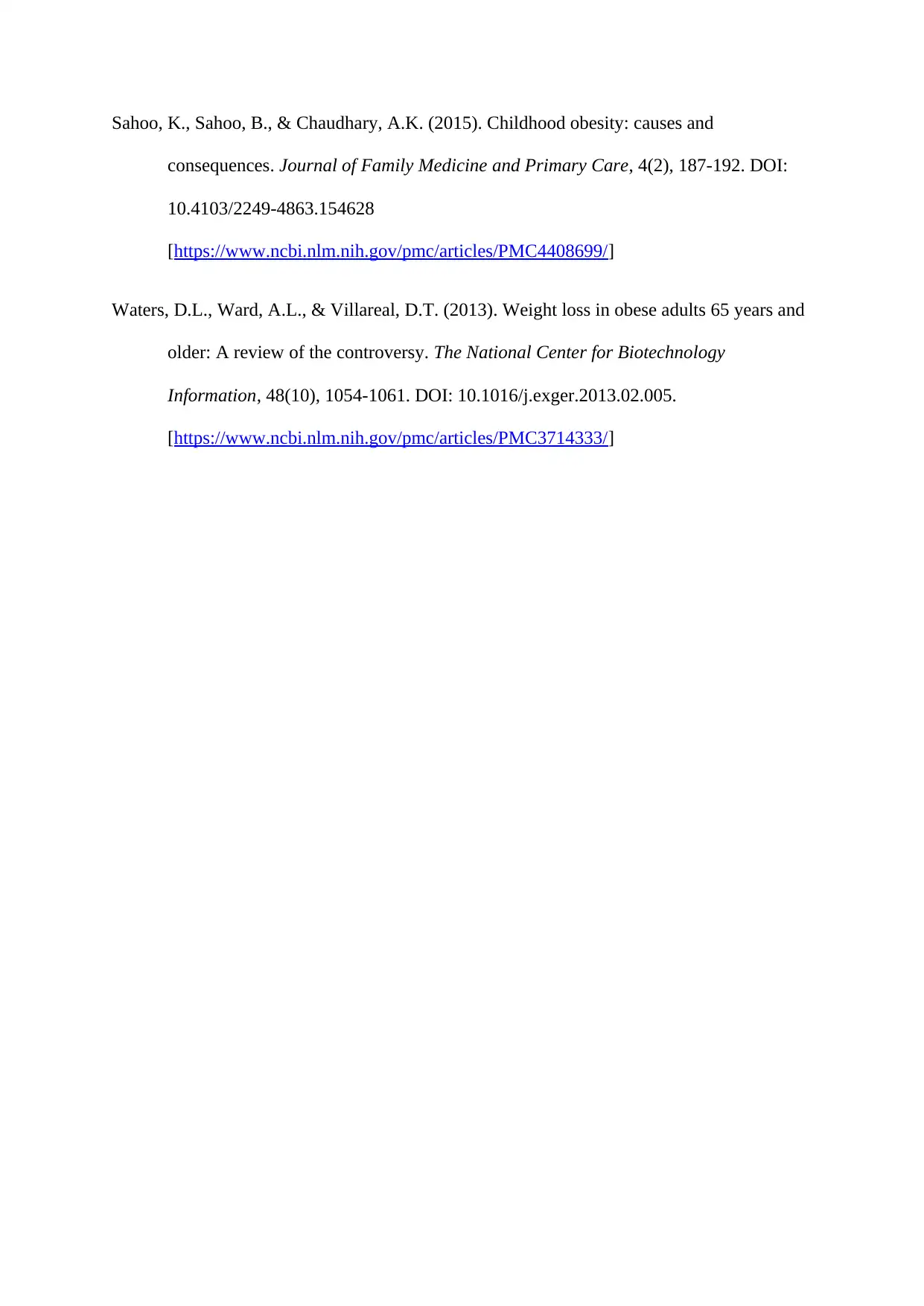
Sahoo, K., Sahoo, B., & Chaudhary, A.K. (2015). Childhood obesity: causes and
consequences. Journal of Family Medicine and Primary Care, 4(2), 187-192. DOI:
10.4103/2249-4863.154628
[https://www.ncbi.nlm.nih.gov/pmc/articles/PMC4408699/]
Waters, D.L., Ward, A.L., & Villareal, D.T. (2013). Weight loss in obese adults 65 years and
older: A review of the controversy. The National Center for Biotechnology
Information, 48(10), 1054-1061. DOI: 10.1016/j.exger.2013.02.005.
[https://www.ncbi.nlm.nih.gov/pmc/articles/PMC3714333/]
consequences. Journal of Family Medicine and Primary Care, 4(2), 187-192. DOI:
10.4103/2249-4863.154628
[https://www.ncbi.nlm.nih.gov/pmc/articles/PMC4408699/]
Waters, D.L., Ward, A.L., & Villareal, D.T. (2013). Weight loss in obese adults 65 years and
older: A review of the controversy. The National Center for Biotechnology
Information, 48(10), 1054-1061. DOI: 10.1016/j.exger.2013.02.005.
[https://www.ncbi.nlm.nih.gov/pmc/articles/PMC3714333/]
1 out of 9
Related Documents
Your All-in-One AI-Powered Toolkit for Academic Success.
+13062052269
info@desklib.com
Available 24*7 on WhatsApp / Email
![[object Object]](/_next/static/media/star-bottom.7253800d.svg)
Unlock your academic potential
© 2024 | Zucol Services PVT LTD | All rights reserved.





